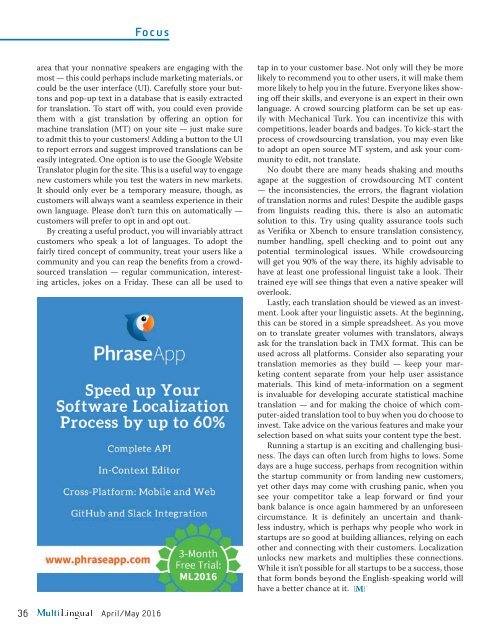Localization
z99kl79
z99kl79
You also want an ePaper? Increase the reach of your titles
YUMPU automatically turns print PDFs into web optimized ePapers that Google loves.
Focus<br />
area that your nonnative speakers are engaging with the<br />
most — this could perhaps include marketing materials, or<br />
could be the user interface (UI). Carefully store your buttons<br />
and pop-up text in a database that is easily extracted<br />
for translation. To start off with, you could even provide<br />
them with a gist translation by offering an option for<br />
machine translation (MT) on your site — just make sure<br />
to admit this to your customers! Adding a button to the UI<br />
to report errors and suggest improved translations can be<br />
easily integrated. One option is to use the Google Website<br />
Translator plugin for the site. This is a useful way to engage<br />
new customers while you test the waters in new markets.<br />
It should only ever be a temporary measure, though, as<br />
customers will always want a seamless experience in their<br />
own language. Please don’t turn this on automatically —<br />
customers will prefer to opt in and opt out.<br />
By creating a useful product, you will invariably attract<br />
customers who speak a lot of languages. To adopt the<br />
fairly tired concept of community, treat your users like a<br />
community and you can reap the benefits from a crowdsourced<br />
translation — regular communication, interesting<br />
articles, jokes on a Friday. These can all be used to<br />
tap in to your customer base. Not only will they be more<br />
likely to recommend you to other users, it will make them<br />
more likely to help you in the future. Everyone likes showing<br />
off their skills, and everyone is an expert in their own<br />
language. A crowd sourcing platform can be set up easily<br />
with Mechanical Turk. You can incentivize this with<br />
competitions, leader boards and badges. To kick-start the<br />
process of crowdsourcing translation, you may even like<br />
to adopt an open source MT system, and ask your community<br />
to edit, not translate.<br />
No doubt there are many heads shaking and mouths<br />
agape at the suggestion of crowdsourcing MT content<br />
— the inconsistencies, the errors, the flagrant violation<br />
of translation norms and rules! Despite the audible gasps<br />
from linguists reading this, there is also an automatic<br />
solution to this. Try using quality assurance tools such<br />
as Verifika or Xbench to ensure translation consistency,<br />
number handling, spell checking and to point out any<br />
potential terminological issues. While crowdsourcing<br />
will get you 90% of the way there, its highly advisable to<br />
have at least one professional linguist take a look. Their<br />
trained eye will see things that even a native speaker will<br />
overlook.<br />
Lastly, each translation should be viewed as an investment.<br />
Look after your linguistic assets. At the beginning,<br />
this can be stored in a simple spreadsheet. As you move<br />
on to translate greater volumes with translators, always<br />
ask for the translation back in TMX format. This can be<br />
used across all platforms. Consider also separating your<br />
translation memories as they build — keep your marketing<br />
content separate from your help user assistance<br />
materials. This kind of meta-information on a segment<br />
is invaluable for developing accurate statistical machine<br />
translation — and for making the choice of which computer-aided<br />
translation tool to buy when you do choose to<br />
invest. Take advice on the various features and make your<br />
selection based on what suits your content type the best.<br />
Running a startup is an exciting and challenging business.<br />
The days can often lurch from highs to lows. Some<br />
days are a huge success, perhaps from recognition within<br />
the startup community or from landing new customers,<br />
yet other days may come with crushing panic, when you<br />
see your competitor take a leap forward or find your<br />
bank balance is once again hammered by an unforeseen<br />
circumstance. It is definitely an uncertain and thankless<br />
industry, which is perhaps why people who work in<br />
startups are so good at building alliances, relying on each<br />
other and connecting with their customers. <strong>Localization</strong><br />
unlocks new markets and multiplies these connections.<br />
While it isn’t possible for all startups to be a success, those<br />
that form bonds beyond the English-speaking world will<br />
have a better chance at it. [M]<br />
36 April/May 2016


